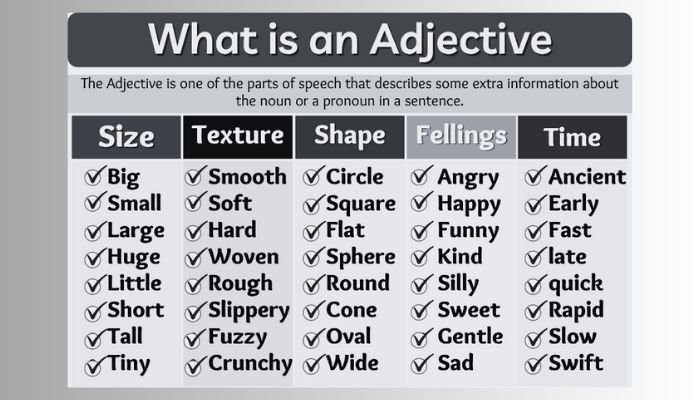Adjective
We explain what an adjective is, its function, degrees and examples in sentences. In addition, the characteristics of each type of adjective.
What are adjectives?
Adjectives make up a grammatical category or class of words that expresses some of the properties or characteristics of the noun it accompanies. Their name comes from the Latin voice adiectivus, “to be added”, and they are usually found within a noun phrase.
Syntactically, adjectives precede or follow the noun they qualify, that is, as direct, immediate modifiers. Therefore, they usually coincide in gender and number with the noun, and consequently have the same inflectional suffixes (-a, -o, -as, -os, -es), although there are adjectives whose ending only allows an accident of gender or of number.
On the other hand, many adjectives have a special condition called apocope, which occurs when they are in certain positions with respect to the noun, in which they lose part of their content. This is what happens in the case of “good man” and “good man”, for example.

types of adjective
Adjectives are classified as follows:
Adjectives. These are those adjectives that attribute certain characteristics to the noun, that is, that explain how it is or detail some of its properties. They have in themselves a recognizable semantic value, which can often be expressed in degrees, and can be further classified into:
- explanatory adjectives. That express abstract or concrete qualities inherent in the noun. They often serve to emphasize this property, especially in poetic language. For example: “blood red”.
- Specific adjectives. That add to the noun a quality that serves to distinguish it from the rest of the objects of the same type. For example: “small dog”.
- Relational adjectives. Those that establish a link between the noun and its context of belonging, thus responding to the idea of “belonging to”. For example: “police agency”, “doctor’s office”.
Determiner adjectives. Normally known as determiners, just plain, these adjectives fulfill a grammatical role, delimiting the referred entities within the sentence, without adding essential meanings to the noun. In turn, they can be of the following types:
- Demonstrative adjectives. That indicate the proximity of the referent to the speaker, or to the other participants in the discourse. For example: “those shoes are brand name”, “that lady’s name is Marisela”.
- Possessive adjectives. Which similarly denote a relationship of belonging to the speaker. For example: “this notebook is yours”, “all the money is yours”.
- numeral adjectives. That introduce the notion of number, that is, of quantity, with respect to the described object. For example: “I would eat a thousand cakes”, “two pounds of flour, please”.
- Exclamatory and interrogative adjectives. That denote the expressive or interrogative intention of the speaker regarding the referred object, whether or not they go within a question (?) or exclamation (!). For example: “How much money did you bring?”, “How right you are!”.
Adjectives examples
Here is a short list of examples of adjectives of each type:
- Qualifying adjectives: sweet, salty, stubborn, meek, fierce, proud, tense, smooth, grooved, common, strange, bizarre, grotesque, happy, sad, dead, alive, flooded, coarse, dry, high, low, slow, fast , vertiginous, heavy, round, resounding, falling, honest, loose, violent, spectacular, harmonious, ribbed, submissive, anecdotal, peasant, supreme, rugged, abstract, concrete, caustic.
- Relational adjectives: dental, police, medical, technological, linguistic, zoological, chemical, physical, school, relational, satellite, astronomical, lunar, solar, musical, referential, legal, onomatopoeic, literary, rhetorical, prosopopoeic, playful, German, Swedish , Venezuelan, American, European, Asian, African, planetary, organizational, business, governmental.
- Determiner adjectives: this, that, those, that, those, his, yours, mine, his, two, four, seven hundred, thousand, how many, which.
Sentences with adjectives
And then some sentences with adjectives:
- This lasagna is delicious.
- Thousands of people flocked to the government headquarters.
- In my dreams you never look so beautiful.
- These oranges are very sweet and fresh.
- A brunette woman came in with dirty shoes that morning.
- Many police officers are corrupt in this country.
- The new book cost me nine hundred pesos.
- Black nights await me without her love.
- How many tickets is she going to buy? So many!
- Tell me how many hours it took you to get there.
- What are your favorite landscapes?
degrees of the adjective
The qualities expressed by most qualifying adjectives are capable of gradation, that is, they can be expressed in different degrees, depending on their quality. Thus, we can differentiate between:
- Positive grade. When the adjective simply expresses a condition in a neutral degree. For example: “tall man”, “beautiful woman”, “boring book”.
- Comparative grade. When the adjective introduces a comparison between one degree and another, or between one object and another, based on the same quality. Unlike other languages, Spanish requires for its comparisons the use of adverbs such as “more” or “less”, and pronouns such as “que” and “como”. For example: “a man taller than another”, “a woman less beautiful than her sister”, “a book as boring as another”.
- Superlative level. When the adjective expresses the maximum degree of the condition, that is, the highest or most intense possible. In those cases, the suffix -ísimo or -érrimo is used, or the help of particles such as “very” or, colloquially, “too much”. For example: “a very tall man”, “a very beautiful woman”, “a very boring book”.
What is it Adjective concept, examples, types and sentences.
| Home Page | Malhath TV |